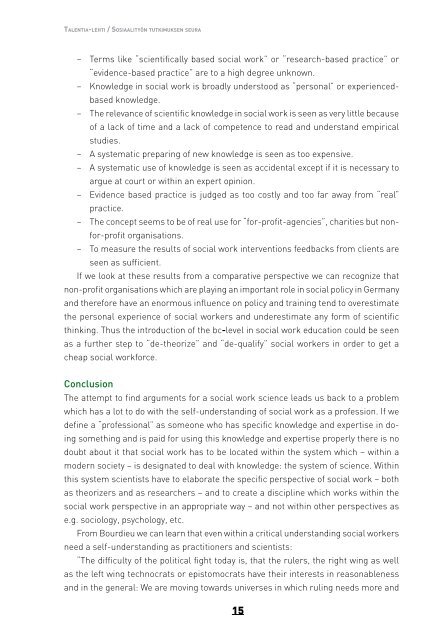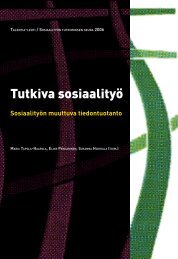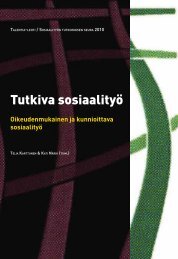Tutkiva sosiaalityö - Sosiaalityön tutkimuksen seura
Tutkiva sosiaalityö - Sosiaalityön tutkimuksen seura
Tutkiva sosiaalityö - Sosiaalityön tutkimuksen seura
You also want an ePaper? Increase the reach of your titles
YUMPU automatically turns print PDFs into web optimized ePapers that Google loves.
Ta l e n t i a-l e h t i / So s i a a l i t y ö n t u t k i m u k s e n s e u r a<br />
– Terms like “scientifically based social work” or “research-based practice” or<br />
“evidence-based practice” are to a high degree unknown.<br />
– Knowledge in social work is broadly understood as “personal” or experiencedbased<br />
knowledge.<br />
– The relevance of scientific knowledge in social work is seen as very little because<br />
of a lack of time and a lack of competence to read and understand empirical<br />
studies.<br />
– A systematic preparing of new knowledge is seen as too expensive.<br />
– A systematic use of knowledge is seen as accidental except if it is necessary to<br />
argue at court or within an expert opinion.<br />
– Evidence based practice is judged as too costly and too far away from “real”<br />
practice.<br />
– The concept seems to be of real use for “for-profit-agencies”, charities but nonfor-profit<br />
organisations.<br />
– To measure the results of social work interventions feedbacks from clients are<br />
seen as sufficient.<br />
If we look at these results from a comparative perspective we can recognize that<br />
non-profit organisations which are playing an important role in social policy in Germany<br />
and therefore have an enormous influence on policy and training tend to overestimate<br />
the personal experience of social workers and underestimate any form of scientific<br />
thinking. Thus the introduction of the bc-level in social work education could be seen<br />
as a further step to “de-theorize” and “de-qualify” social workers in order to get a<br />
cheap social workforce.<br />
Conclusion<br />
The attempt to find arguments for a social work science leads us back to a problem<br />
which has a lot to do with the self-understanding of social work as a profession. If we<br />
define a “professional” as someone who has specific knowledge and expertise in doing<br />
something and is paid for using this knowledge and expertise properly there is no<br />
doubt about it that social work has to be located within the system which – within a<br />
modern society – is designated to deal with knowledge: the system of science. Within<br />
this system scientists have to elaborate the specific perspective of social work – both<br />
as theorizers and as researchers – and to create a discipline which works within the<br />
social work perspective in an appropriate way – and not within other perspectives as<br />
e.g. sociology, psychology, etc.<br />
From Bourdieu we can learn that even within a critical understanding social workers<br />
need a self-understanding as practitioners and scientists:<br />
“The difficulty of the political fight today is, that the rulers, the right wing as well<br />
as the left wing technocrats or epistomocrats have their interests in reasonableness<br />
and in the general: We are moving towards universes in which ruling needs more and<br />
15









